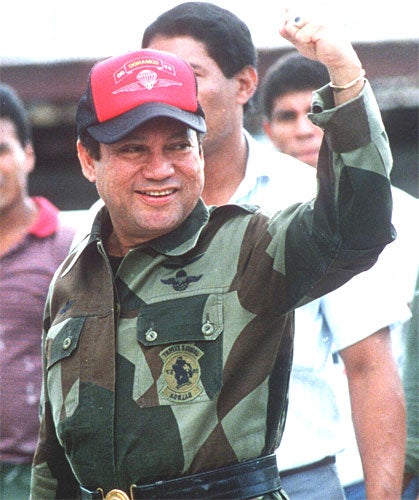After 20 years in US jail, Noriega faces new trial in France
Panamanian dictator toppled by Bush Sr extradited on money-laundering charge

Your support helps us to tell the story
From reproductive rights to climate change to Big Tech, The Independent is on the ground when the story is developing. Whether it's investigating the financials of Elon Musk's pro-Trump PAC or producing our latest documentary, 'The A Word', which shines a light on the American women fighting for reproductive rights, we know how important it is to parse out the facts from the messaging.
At such a critical moment in US history, we need reporters on the ground. Your donation allows us to keep sending journalists to speak to both sides of the story.
The Independent is trusted by Americans across the entire political spectrum. And unlike many other quality news outlets, we choose not to lock Americans out of our reporting and analysis with paywalls. We believe quality journalism should be available to everyone, paid for by those who can afford it.
Your support makes all the difference.Manuel Noriega, former Panamanian dictator and convicted drugs trafficker, began an extended stay in France yesterday very different from the gilded Parisian retirement that he once planned.
Noriega, known as "Pineapple Face" – although never in his presence – was extradited from the US to France early yesterday morning after spending two decades in prison in Florida. The once-feared strongman, now said to be 72 or 76 and partially paralysed, has already been convicted in France on charges of money-laundering. He faces a new trial in June.
According to his lawyers in France and Panama, his extradition was illegal, politically motivated and designed to avoid a potentially embarrassing return to Panama. At one time, Noriega was a former CIA informant and a close ally of both the US and France. In 1989, he was toppled by a US invasion after turning his tiny Central American republic into a hub for Colombian drug traffickers.
During a brief public hearing before a remand judge yesterday afternoon, Noriega asked to be "repatriated" under the "prisoner of war" status he was granted in the US. Looking frail and worn, and nothing like the brutal figure who terrorised Panama for eight years, Noriega said: "As a prisoner of war, I have a right to everything guaranteed by the Geneva convention, including the right to go home when my captivity is over."
One of his French lawyers, Yves Leberquier, said that the former dictator was no longer the burly, arrogant figure of his days in power. "I had photos in mind from 20 years ago," Mr Leberquier said. "But he is old and sick ... he had a stroke about four years ago and it has left him a little handicapped on the right-hand side."
After retiring to consider his decision for an hour, the judge placed Noriega in custody. His new home, at least until June, will be the VIP wing of the Santé Prison in southern Paris. Just over a kilometre away, in the elegant, ministerial quarter of the French capital, are three luxury apartments that Noriega bought in the 1980s, allegedly with money from the Medellin cocaine cartel in Colombia.
The apartments – the centre of the French charges against him – were intended as retirement homes for Mr Noriega, his wife Felicidad and their three daughters.
The former president, known to his enemies as "Pineapple Face" because of his pock-marked skin, insists that the 35 million French francs (£3.5m) he spent in France, came from the CIA and from a family bequest. His lawyers say that his French convictions in absentia and the anticipated new charges are null and void. Noriega was a head of state at the time of the alleged offences and therefore is immune under French law, they say.
Whatever the legal rights and wrongs, it is unprecedented for a former head of state to serve 20 years in prison abroad and then be extradited to face similar charges in another country. Noriega has been sentenced, also in his absence, to more than 50 years in jail in Panama for crimes committed during his eight years in power, including the murder of opposition politicians. The Panamana government said yesterday that it "respected" the "sovereign" right of the US to send its former president to France, not Panama, if it so wished.
However, Noriega's Panamanian lawyer, Julio Berrios, insisted that a "secret deal" had been made between Washington, Paris and Panama when Noriega's US sentence expired in 2007 (after reductions for good behaviour). He said that Noriega knew too much about too many people in Panama to be allowed to go home.
The dictator and his family made frequent shopping visits to France when he was in power from 1981 to 1989. He and his wife bought three apartments in 1983-84, in the seventh arrondissement, close to the River Seine, including one on the Quai d'Orsay, near the foreign ministry. Although it is now alleged that the flats were bought with Colombian drug money, the then French government saw no reason to complain. In 1987, Noriega was made a commander of the Légion d'honneur, one of the highest awards that can be bestowed on a foreign leader.
Two years later, Noriega had fallen out with the West and especially with the US. Panama was being used openly as a staging post for cocaine shipments. President George Bush Senior ordered an invasion in December 1989 and Noriega was captured early in 1990.
Some doubt surrounds Noriega's age. According to French court records, he is 76, but Panama insists that he is only 72. As a young man, his country says, he exaggerated his age in order to enter the military academy.
Join our commenting forum
Join thought-provoking conversations, follow other Independent readers and see their replies
Comments